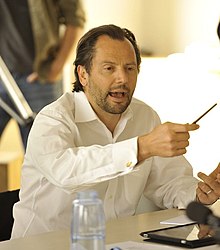Luigi Zingales
You can helpexpand this article with text translated fromthe corresponding articlein Italian.(April 2024)Click [show] for important translation instructions.
|
Luigi Zingales | |
|---|---|
 | |
| Born | 8 February 1963 |
| Education | Bocconi University(MA) Massachusetts Institute of Technology(PhD) |
| Academic career | |
| Institution | University of Chicago,U.S. |
| Field | Business economics |
| Doctoral advisor | James M. Poterba[1] Oliver Hart[1] |
| InformationatIDEAS / RePEc | |
Luigi Zingales(Italian pronunciation:[luˈiːdʒiddziŋˈɡaːles];born 8 February 1963) is an Italian academic who is a finance professor at theUniversity of Chicago Booth School of Business.His bookSaving Capitalism from the Capitalists(2003) is a study of "relationship capitalism".[2]InA Capitalism for the People: Recapturing the Lost Genius of American Prosperity(2012), Zingales "suggests that channeling populist anger can reinvigorate the power of competition and reverse the movement toward a 'crony system'. "[3][4]
Career[edit]
Zingales received a bachelor's degree in economics fromBocconi UniversityinMilan.In 1992 he earned aPh.D.in Economics from theMassachusetts Institute of Technologywith the completion of his thesis, titledThe value of corporate control,under the supervision ofJames M. PoterbaandOliver Hart.[5]In the same year he joined the faculty of theUniversity of Chicago Booth School of Business,where he is theRobert C. McCormackDistinguished Service Professor of Entrepreneurship and Finance.[6]Zingales also serves as a member of theCommittee on Capital Markets Regulation.[7]He also co-hosts the podcastCapitalisn'talong with journalistBethany McLean.
Positions[edit]
Zingales has voiced support for greater regulation of the banking and technology industries.[8]Perhaps most interesting is his support of theUnited States debt ceiling,which is almost universally held in low regard by his colleagues.[9][citation needed]
In July 2012, Zingales took part in the 'No-Brainer Economic Platform' project ofNPR's programPlanet Money.He supported a six-part reform plan that involved eliminating all Americanincome,corporate,andpayroll taxesas well as thewar on drugsand replacing the system with a broadconsumption tax(including ta xing formerly illegal substances).[10][11]
Zingales generated controversy in 2018 when he invited former White House Chief StrategistSteve Bannonto debateglobalizationandimmigrationat theUniversity of Chicagoagainst an undecided expert in the field. The decision sparked protests from students and faculty given Bannon's history of controversial statements.[12]
Studies[edit]
His main field of study is business economics, with a heavy focus on organizations and entrepreneurship.[citation needed]
Awards[edit]
He was the winner of the 2003Germán Bernácer Prizeto the best European economist under 40 working in macro-finance.[13] In 2012, he was named byForeign Policymagazine to its list of FP Top 100 Global Thinkers, "For reminding us what conservative economics used to look like."[14]
Books[edit]
- Saving Capitalism from the Capitalists,Random House, New York, 2003; Co-authored withRaghuram G. Rajan
- A Capitalism for the People:Recapturing the Lost Genius of American Prosperity,Basic Books, New York, 2012
References[edit]
- ^abZingales, Luigi (1992).The value of corporate control(Ph.D.).MIT.hdl:1721.1/13214?show=full.Retrieved8 December2016.
- ^Postrel, Virginia (4 December 2003)."Economic Scene; Are open markets threatened more by a pro-business or by an antibusiness ideology?".The New York Times.
- ^"Nonfiction review".Publishers Weekly.23 April 2012.
- ^Plender, John (15 April 2012)."Nostalgia for the land of opportunity".The Financial Times.
- ^Zingales, Luigi (1992).The value of corporate control by Luigi Zingales(Thesis). MIT Library.hdl:1721.1/13214?show=full.Retrieved17 September2015.
- ^"Luigi Zingales".Retrieved18 June2012.
- ^"Committee on Capital Markets Regulation".Retrieved18 June2012.
- ^Zingales, Luigi (29 May 2012)."How Political Clout Made Banks Too Big to Fail".bloomberg.Retrieved6 October2020.
- ^Register, Orange County (23 January 2013)."Luigi Zingales: Congress needs to keep debt ceiling".
- ^"Six Policies Economists Love (And Politicians Hate)".NPR.org.
- ^"Episode 387: The No-Brainer Economic Platform".NPR.org.
- ^Hogan, Susan (26 January 2018)."Steve Bannon invitation sparks protests at University of Chicago".Washington Post.ISSN0190-8286.Retrieved6 February2018.
- ^"Bernacerprize".Bernacerprize.
- ^"The FP Top 100 Global Thinkers".Foreign Policy.26 November 2012.Archivedfrom the original on 30 November 2012.Retrieved28 November2012.
External links[edit]
- Living people
- Massachusetts Institute of Technology School of Science alumni
- Bocconi University alumni
- University of Chicago Booth School of Business faculty
- Italian economists
- Fellows of the American Academy of Arts and Sciences
- 1963 births
- Manhattan Institute for Policy Research
- Writers from Padua
- Italian emigrants to the United States
- Presidents of the American Finance Association
